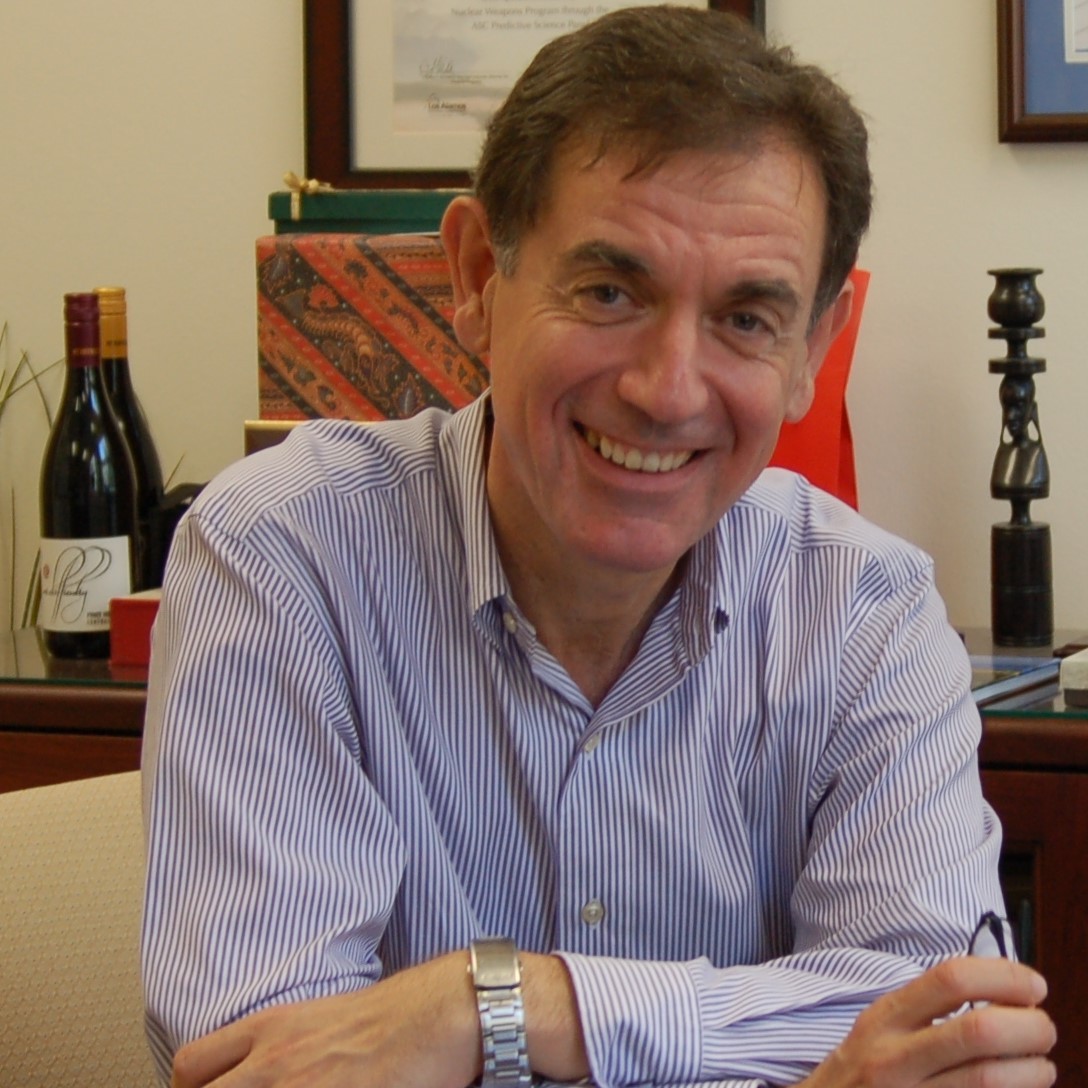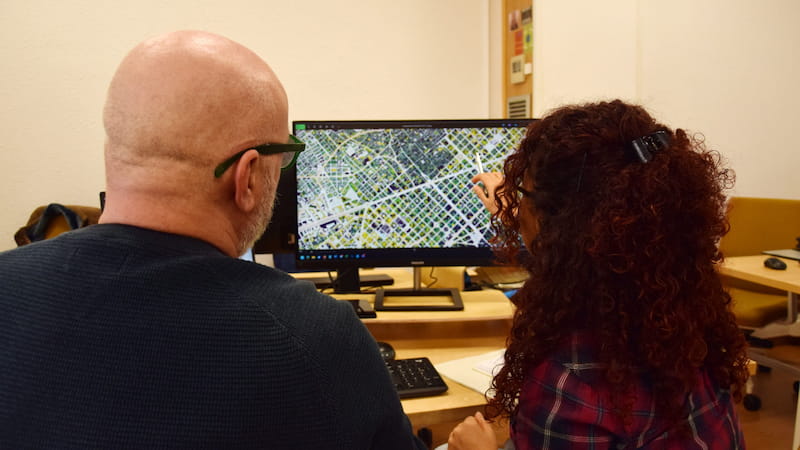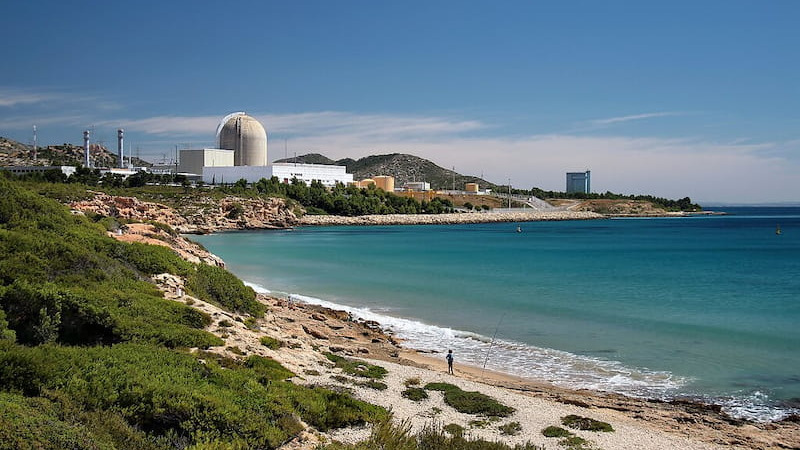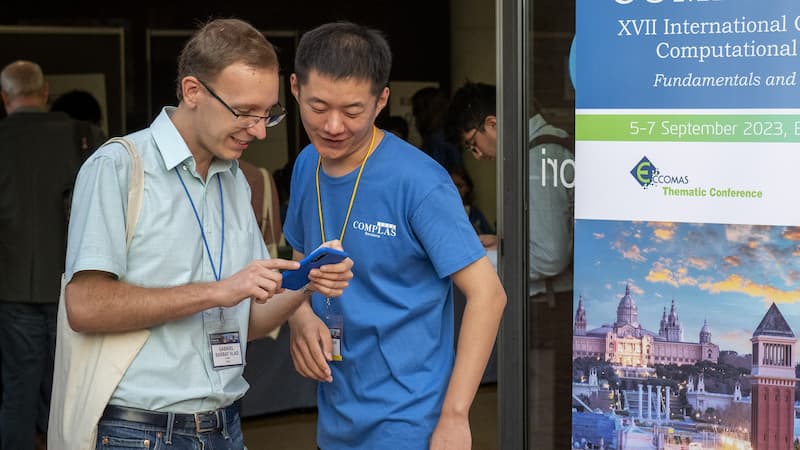📅 Tuesday, October 28, 2025
🕛 6 PM CET
📍 Sala Cotxeres, Palau Robert (Passeig de Gràcia 107, 08008 Barcelona)
✍🏽 Register Here (spots are limited)
Join us for this Seminar on Quantum Computing from the new head of the UNESCO Chair in Numerical Methods in Engineering of UPC and CIMNE, Prof. Michael Ortiz.
The event will include an official handover ceremony of the Chair to Prof. Ortiz.
ABSTRACT
Computational mechanics, since its inception in the ’60s, has tracked developments in both theoretical and applied mechanics, as well as scientific computing. It started with the basics of finite-element development and solvers, with scant attention given to material modelling and physics of solids. However, early in the game a more ambitious plan emerged that encompassed nonlinear material behaviour, history dependence and dissipation, coupled thermodynamics and phase transitions, extreme conditions of temperature, pressure, and rate of deformation, and generally the full gamut of constitutive behaviour of solids. In that way, computational mechanics tracked sweeping trends in the field of solid mechanics, including rational mechanics, micromechanics and multiscale analysis, uncertainty quantification and, more recently, data science and quantum computing. Thus, epochal advances in ab initio methods and experimental science have effectively changed solid mechanics from a data-poor and mostly empirical field to an increasingly data-rich and physics-based field. This paradigm shift raises many fundamental challenges concerned with how best to generate, manage and use material data to enable discovery, prediction, and design. Deep mathematical and practical questions arise regarding how to generate data, how to build data into boundary value problems, how to ensure predictive accuracy and convergence of the solutions, and others. Recently, a new potentially game-changing paradigm has arrived in computational mechanics, namely, quantum computing. Quantum computers, operating on entirely different physical principles and abstractions from those of classical digital computers, have the unique ability to simultaneously evolve the state of an entire quantum system, which leads to quantum parallelism and interference. In addition, quantum entanglement enables the representation of systems of enormous dimensionality with a modicum of quantum bits, or qubits. Despite these prospects, opportunities to bring quantum computing to bear on problems of computational mechanics in general and, specifically, on data-driven computational mechanics, remain largely unexplored. Exploratory work to date suggests that quantum computing can indeed accelerate exponentially stubborn long-standing bottlenecks in classical multiscale and data-driven computational mechanics, thus bringing them closer to the realm of feasibility and practicality.
SPEAKER
 Professor Ortiz received a BS degree in Civil Engineering from the Polytechnic University of Madrid, Spain, and MS and Ph.D. degrees in Civil Engineering from the University of California at Berkeley. From 1984-1995 he held a faculty position in the Division of Engineering of Brown University, where he carried out research activities in the fields of mechanics of materials and computational solid mechanics. In 1995 he became Professor of Aeronautics at the California Institute of Technology where he is Frank and Ora Lee Marble Professor Emeritus of Aeronautics and Mechanical Engineering since his retirement from teaching duty in August of 2020. He has also been Adjunct Professor and Distinguished Timoshenko Fellow in Mechanical Engineering at Stanford University, has held a Bonn Research Chair in the Institute for Applied Mathematics of Bonn University, Germany, both till 2024, and currently holds the UNESCO Chair of Computational Methods in Engineering at the Polytechnic University of Barcelona. Professor Ortiz is the recipient of honorary doctorates from the Polytechnic University of Madrid and the University of Glasgow. He is a Fellow of the US Association for Computational Mechanics, corresponding Member of the Spanish Academy of Engineering, elected Fellow of the American Academy of Arts & Sciences, elected Member of the US National Academy of Engineering and in 2018 was inducted to the University of California, Berkeley, CEE Academy of Distinguished Alumni. Professor Ortiz is the recipient of the 2002 International Computational Mechanics Award of the International Association of Computational Mechanics (IACM), the 2007 Ted Belytschko Medal of the US Association of Computational Mechanics (USACM), the inaugural 2008 Rodney Hill Prize conferred every four years by the International Union for Theoretical and Applied Mechanics (IUTAM), the 2011 Zienkiewicz Prize of the Spanish Association for Numerical Methods in Engineering (SEMNI), the 2015 Timoshenko Medal of the American Society of Mechanical Engineers (ASME), the 2019 John von Neumann Medal of the USACM, and the 2025 Ericksen Medal of the US Society for Industrial and Applied Mathematics (SIAM).
Professor Ortiz received a BS degree in Civil Engineering from the Polytechnic University of Madrid, Spain, and MS and Ph.D. degrees in Civil Engineering from the University of California at Berkeley. From 1984-1995 he held a faculty position in the Division of Engineering of Brown University, where he carried out research activities in the fields of mechanics of materials and computational solid mechanics. In 1995 he became Professor of Aeronautics at the California Institute of Technology where he is Frank and Ora Lee Marble Professor Emeritus of Aeronautics and Mechanical Engineering since his retirement from teaching duty in August of 2020. He has also been Adjunct Professor and Distinguished Timoshenko Fellow in Mechanical Engineering at Stanford University, has held a Bonn Research Chair in the Institute for Applied Mathematics of Bonn University, Germany, both till 2024, and currently holds the UNESCO Chair of Computational Methods in Engineering at the Polytechnic University of Barcelona. Professor Ortiz is the recipient of honorary doctorates from the Polytechnic University of Madrid and the University of Glasgow. He is a Fellow of the US Association for Computational Mechanics, corresponding Member of the Spanish Academy of Engineering, elected Fellow of the American Academy of Arts & Sciences, elected Member of the US National Academy of Engineering and in 2018 was inducted to the University of California, Berkeley, CEE Academy of Distinguished Alumni. Professor Ortiz is the recipient of the 2002 International Computational Mechanics Award of the International Association of Computational Mechanics (IACM), the 2007 Ted Belytschko Medal of the US Association of Computational Mechanics (USACM), the inaugural 2008 Rodney Hill Prize conferred every four years by the International Union for Theoretical and Applied Mechanics (IUTAM), the 2011 Zienkiewicz Prize of the Spanish Association for Numerical Methods in Engineering (SEMNI), the 2015 Timoshenko Medal of the American Society of Mechanical Engineers (ASME), the 2019 John von Neumann Medal of the USACM, and the 2025 Ericksen Medal of the US Society for Industrial and Applied Mathematics (SIAM).






